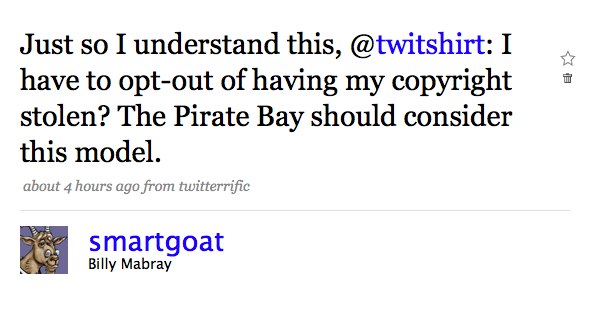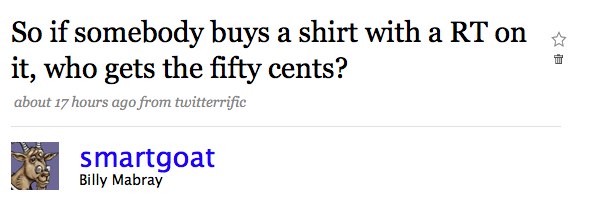Recently, in the Twitter category…
Update: Looks like Twitshirt is changing their policy. Great to see a company respond so quickly to the community.

So, yeah, Twitshirt. I want to be clear that my objection is not for me personally. Do whatever you want with my words — once I’ve said them, I’m done with them. In fact, once they switch from the password anti-pattern to oAuth I’ll likely sign up and dutifully wait the 20 years it will take for me to earn enough to get a check. But that’s me, and you should never assume you can use someone else’s work without permission.
Because that’s really the problem here: permission. While royalties and opt-out forms are improvements over past attempts to sell tweets on shirts, it’s still not right. That’s not how copyright works. I can’t stand on a street corner and sell copies of Wall-E with a simple disclaimer that I’ll stop if I’m asked to. And Disney’s certainly not going to be interested in my offer of a 2.5% royalty.
It’s made worse by the fact that Airbag Industries, the company behind Twitshirt, is one I really admire. I expect better than this from them. My guess is they didn’t think it through. If they had, they would’ve seen that opt-out is wrong. They also might have realized all the other problems they were setting themselves up for.
So you wanna sell Tweet Shirts

This is the first problem that occurred to me. It’s also the first opportunity that occurred to me: What’s stopping me from retweeting everything that @hotdogsladies (who is opting-out) posts and making a killing on royalties? As far as I can tell, only morals.
Now, how ‘bout we print this shirt:

Think anybody will have a problem with that? Or maybe something like this:

Our little tweetshop has been in business five minutes and we’ve already committed copyright infringement, trademark infringement, and libel. Feels like a Monday, doesn’t it?
It’s a good idea. A really good idea. But from a practical standpoint, it just doesn’t work. I can only think of two ways to do it right: Create a CafePress style site, where individual Twitterers set up their own shops and you take a cut. Or, find individual tweets you like, negotiate a price with the writers, and sell limited runs of the shirts. Offering any tweet is so tempting, but it’s a world of hurt.
I hope Airbag realizes they’ve made a mistake and, at the very least, switch from opt-out to opt-in. It matters because words matter, regardless of whether you can sell them on a t-shirt.
Man, Dan Farber is an entrepreneurial genius. While the folks over at Twitter have been racking their brains trying to come up with a way to make money, ol’ Dan has it figured out: charge for the service. Why not advertising? Well, because:
[Twitter users] won’t appreciate ads slipped into their Twitter stream.
This despite the fact that one of the most popular Twitter clients, Twitterrific, has an ad-supported version, and most users choose it. Or the fact that their already running ads on Twitter Japan, and I haven’t heard about a mass exodus by the Japanese people. But Twitter wouldn’t have to go down that path if we users weren’t so cheap:
Here’s a solution. How about paying for what you like to use. Much of what gets sent via Twitter is a form of self-advertising. If you like Twitter so much, how about paying $5 a month for the privilege.
At this point, I probably would be willing to pay for Twitter. It’s the one Web 2.0 service I find both entertaining and useful. The problem is, what happens when I pay for the service, but none of my friends do? Then it’s far less useful to me. In fact, this is the problem for all social sites: If they limit it to only paying customers, it becomes far less social, and far less interesting.
But, as Dan has pointed out, the problem is really us cheap users. In fact, we’re a plague on other medias as well:
…why aren’t people willing to pay for what they use? Public radio has the same problem, hence the tedious pledge drives.
There are so many problems with that last sentence, I don’t know where to begin. Pledge drives are how people pay for public radio. The fact that public radio exists and continues to do pledge drives means it is a working business model. How else does Dan think people should pay for a service that is broadcast free over the air? Perhaps he thinks NPR should have been set up as a subscriber-only satellite radio service from the beginning… in 1970… before there was satellite radio…
And of course we know users wouldn’t put up with ads on a radio station. That’s just crazy talk.
You have to admit, Twitter is in a pretty nice position — people so love their service, they keep suggesting ways the company can make money and stay in business. But the Twitter folks have said in the past (And if anybody remembers where, please post it in the comments. I can’t seem to find it now.) that they have plans for generating revenue, but they want to stabilize their platform before they ask users or advertisers for money. In fact, that’s exactly what they’ve done with Twitter Japan: It’s a smaller user base than the rest of Twitter, so they obviously consider it stable enough to run some advertising.
But thanks for the suggestion, Dan. Now I have an idea for CBS: Ask for your money back.






